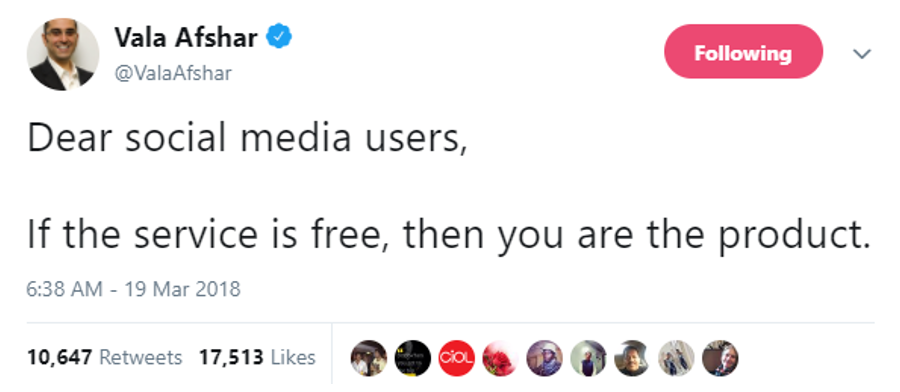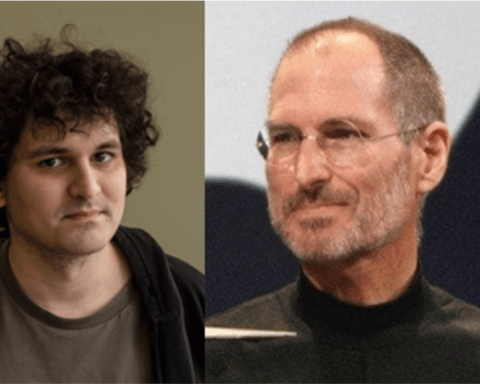*Mark Zuckerberg addressing the Y Combinator Startup School at Stanford University: “I want to stress the importance of being young and technical,” he stated, adding that successful start-ups should only employ young people with technical expertise.
(Zuckerberg also apparently missed the class on employment and discrimination law.) “Young people are just smarter,” he said, with a straight face, according to VentureBeat. “Why are most chess masters under 30?” he asked. “I don’t know…Young people just have simpler lives. We may not own a car. We may not have family.” (Margret Kane March 28, 2007 www.cnet.com)
Cambridge Analytica harvested data from 87 million Facebook users without permission. That would be one quarter of the U.S. population.
Apparently, the brilliant young people who run Facebook have a few shortcomings, not the least of which would be allowing data of “clients” to be hacked. Research reveals (source: Zephoria Digital Marketing) that the most common age demographic of Facebook users (29.7%) are between the ages of 25 to 34. As I understand it, the young people (teenagers) have already disposed of Facebook because it’s something only “old” people use.
Zephoria via CNN states that there are 83 million fake profiles. To quote Zephoria, “There are various reasons for fake profiles, including professionals doing testing and research, and people who want to segment their Facebook use more than is possible with one account.”
I love all the honesty the internet has brought us.
Or not.
Certainly, “professionals” need to mislead people in order to get the information that they need. Again, or not.
Then there is the ongoing drama and investigations on the social media and its impact on the 2016 presidential election, the impact of which the young and brilliant Zuckerberg described as “a pretty crazy idea” on November 11 of that year. As for the subscribers of Facebook, it has changed its privacy policies more times than can be counted; and every time it was releasing more information about its users.
One more time, for everyone to understand, Facebook makes money by selling the information that people give it.
Sure, you can post things for free and contact your friends via this social media giant. As one Gerry Demski quoted B.F. Skinner in The Wall Street Journal of April 2: “a system of slavery so well designed that does not breed revolt is the real threat.”
The hacking of information is no big surprise to many people, but still rather shocking to Facebook and its executives, none of whom have been released as of this writing. Facebook has hurriedly now changed its policies and political postings will have to reveal the origin of the poster, as if that will help. After all, there are only 83 million fake profiles, so the new policy of forcing the poster of content will ensure honesty on Facebook. Or not.

“Life is about learning from the mistakes and figuring out what you need to do to move forward,” said Zuckerberg recently, who is 33. Mr. Zuckerberg, by his own words, is just an old college dropout that needs to move on and accept that corporate America isn’t interested in people who have learned from their mistakes and are looking to move forward.
People with far more influence than myself have suggested that Zuckerberg step down, and every time Facebook falls on its countenance, the fearless leader invents a new reason why he should remain, offering a less-than-convincing argument that he has the situation well in hand and knows how to solve it. The really brilliant people see problems and resolve them before they occur, and, I could be wrong, but experience seems plays a role in those abilities.
Some of us have had the younger boss who grew bitter when our experience gave us the foresight to predict problems, and then we said: “Well, no one saw this one coming, now did we?” Foresight often just foments resentment.
I should state that if you are happy with Facebook, as a client, follower, or investor, then, by all means, at least consider your position. The great thing about billionaires is that they can buy their jobs. Many of the over-educated and underemployed do not have that luxury.
Listen carefully to what the college drop-out says to Congress, if he decides to grace them with his testimony.
He’s quite the engaging, even riveting speaker. Many things, corporations included, end up being something that the inventors never intended for them to be. Alfred Nobel intended dynamite to be used for construction; it didn’t turn out quite the way it was intended. The internet was intended to help scientists share information, and if you don’t believe that, just ask Al Gore. By his own words, the aging founder of Facebook dug his grave less than a decade ago.
“Young people are just smarter,” he said, with a straight face.

Jeffrey Neil Jackson is an
Educator & Literary Mercenary












